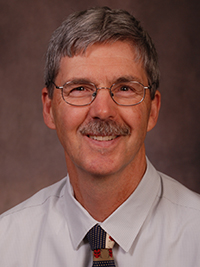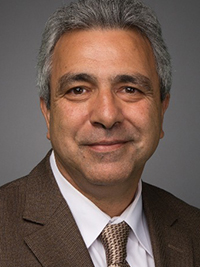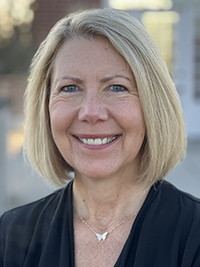Distinguished status awarded for extraordinary service to ESA
Annapolis, MD; August 29, 2024—In recognition of their long-term dedication and significant contributions to the Entomological Society of America (ESA), three entomologists have been selected as Honorary Members of the Society in 2024.
Honorary Membership acknowledges those who have served ESA for at least 20 years through significant involvement in the affairs of the Society that has reached an extraordinary level. Candidates for this honor are selected by the ESA Governing Board and then voted on by the ESA membership.
This year's honorees will be recognized during Entomology 2024, November 10-13, in Phoenix, Arizona
ESA's 2024 Honorary Members are:
- Gary J. Brewer, University of Nebraska-Lincoln
- Mustapha Debboun, Delta Mosquito and Vector Control District
- Michelle S. Smith, Corteva Agriscience
 Gary J. Brewer
Gary J. Brewer
University of Nebraska-Lincoln
Gary received his Ph.D. in entomology from Kansas State University in 1984. His M.S. in entomology (1978) and B.S. in zoology (1974) were from the University of Nebraska. He joined the entomology department at North Dakota State University (NDSU) in 1985 as an assistant professor and was chair from 1999 to 2006. From 2006 through 2018, he was head of the Department of Entomology at the University of Nebraska-Lincoln (UNL). Overall, he has served in departmental leadership roles for 21 years.
Gary has been a member of the Entomological Society of America since 1977 and has served on many ESA committees. He was secretary and chair of section Fa, Host Plant Resistance to Insects, and served two terms on the Governing Board as the North Central Branch representative. His service to the North Central Branch has included committees (often as chair), symposia organizer, twice as local arrangements co-chair, and NCB president in 2004-05. An early ESA accomplishment was being a member of the winning team from Kansas State University at the first national Entomology Games competition in San Diego in 1983.
He has provided significant leadership to other relevant organizations. He served as secretary and chair of the Council of Entomology Department Administrators (CEDA), which is now an ESA affiliate organization. He was a member of the Board of Representatives of the Council for Agricultural Science and Technology (CAST), first as the CEDA representative and later to represent ESA. He also chaired the CAST Plant Work Group.
He also provided service to other scientific societies or organizations. He was president of the Kansas Entomological Society in 2018, the UNL Chapter of Gamma Sigma Delta in 2019, and the Sigma Xi chapter at North Dakota State University in 1994.
He stepped away from the department head position at UNL after 12 years and rejoined the faculty in 2019 as professor of insect management with research and teaching responsibilities. He is currently teaching a graduate and undergraduate integrated pest management class and an undergraduate crops entomology class. His major research thrust has shifted from crops to veterinary IPM, with emphases on novel strategies and tactics. Other efforts include collaborations in crop IPM systems and conservation of the federally endangered Salt Creek tiger beetle. He has published over 50 refereed papers and has generated more than $4 million in external funding.
Over his career, he has taught 12 different classes at the undergraduate and graduate levels, including classes taught totally online, and he has been responsible for a large range of degree programs. As department chair or head, he oversaw entomology Ph.D. and M.S. programs at UNL and NDSU. In addition, as the entomology department head at UNL he concurrently managed insect science, forensic science, and applied science undergraduate majors and at NDSU he was coordinator for the plant protection major.
A recent international activity was leading a design team in developing and implementing an experiential-based major in conservation agriculture for the Rwandan Institute for Conservation Agriculture, a Bachelor of Science degree-awarding institution that accepted its first students in the fall of 2019, with the first batch of students graduating in 2023.
 Mustapha Debboun
Mustapha Debboun
Delta Mosquito and Vector Control District
Dr. Mustapha Debboun, BCE, is a distinguished member of the U.S. Army Medical Department, an ESA Board Certified Medical and Veterinary Entomologist, educator, and researcher in insect repellents. A native of Morocco, he received his B.A. in cellular and molecular biology from Skidmore College in Saratoga Springs, New York, an M.S. in entomology from the University of New Hampshire, and a Ph.D. in medical and veterinary entomology from the University of Missouri-Columbia. He served 25 years in the U.S. Army Medical Services Corps as a medical and veterinary entomologist in various leadership positions and diverse entomological assignments including four wars (Operations Desert Shield and Storm, Operation Endeavor, Enduring Freedom, and Iraqi Freedom). Following his retirement from the military as a colonel, he was selected as the director of Harris County (HC) Public Health Mosquito and Vector Control Division, where he directed and led the development and implementation of prevention and control of mosquitoes for the 5 million residents of HC and the City of Houston, and as a general manager of Delta Mosquito and Vector Control District in Visalia, California, where he also provided outstanding mosquito control and surveillance service to the residents of over 15 cities in Tulare County to protect them from mosquito bites and mosquito-borne diseases.
Debboun's extraordinary service to ESA was extensive and impactful. He has been a member since 1985 and participated in 38 Annual Meetings and numerous Branch Meetings and committees. His three decades of outstanding service include ESA Governing Board (GB) member (2019-2022); GB liaison to the Committee on Awards and Honors (2019-2022); vice president and president of the Medical, Urban, & Veterinary Entomology (MUVE) Section (2015-2018); ESA MUVE representative to the Vector-Borne Disease Network (VBDN) (2019-Present); co-developer and organizer of the Joint ESA and American Mosquito Control Association Public Health Entomology Certificate (2015-2018); chair, ESA Editorial Review Board, Journal of Medical Entomology (2014-2016); invited by ESA president Grayson Brown as a team representative to the Global Zika Summit at the Joint Brazilian & Latin American Congress of Entomology in Maceio, Brazil (2016); director, ESA Certification Board (2012-2014); military's liaison to the ESA Certification Board (2004-2014); secretary and president of the former ESA International Affairs Committee (IAC) (2007-2010); organizer and moderator of 23 ESA symposia (2000-Present); judge for ESA graduate and undergraduate student presentations and posters (2000-present); passionate recruiter of military and civilian ESA members to achieve ACE and BCE Certification (2004-present); and currently as a member of the ESA Awards and Honors Canvassing Committee.
Some examples of Debboun's extraordinary and impactful ESA service were: co-forming and assisting the former ESA president Grayson Brown to form the current ESA International Branch when Debboun was the president of the IAC; promoted the formation of MUVE Section as ESA transitioned to a four-Section model; a tireless proponent of ESA who created and promoted a very strong culture of involvement and participation in the ESA among all military entomologists and still currently encourages them to achieve ACE and BCE certification; worked on an important issue of ESA's Diversity, Equity, and Inclusion (DEI) initiatives while serving as a GB member; invites inclusively domestic and international presenters to his well established, moderated, and attended annual ESA Insect Repellent Symposium; and always strives to make ESA the best Society in the world through his exceptional service.
Debboun has published over 135 peer-reviewed publications, 24 book chapters, and five co-edited books on insect repellents and public healthy entomology. Outside ESA, he is known both nationally and internationally, particularly for his numerous years of global military and civilian significant entomological community outreach and voluntary service to ICE, AMCA, ASTMH, EPA, SOVE, and more. His global military and civilian entomological work have taken him to over 35 different countries in Africa, Asia, Australia, Europe, and South America. His main goal has been to provide efficient and sustainable management of disease vectors and human protection from mosquito and vector-borne diseases, using not only conventional means but innovative and integrated vector management, as well.
Some of Debboun's prestigious awards and honors include: American Mosquito Control Association Meritorious Service Award (2021), Fellow of the ESA (2017), U.S. Army Legion of Merit (2014), Distinguished Service Award to the ESA Certification Program (2010), six Army Meritorious Service Medals (1994-2005), two Bronze Star Medals during two wars (2003 and 1991), Order of Military Medical Merit (2003), Global War on Terrorism Service Medal (2003), U.S. Army Surgeon General's "A" Professional Proficiency Designator for excellence and expertise in Medical and Veterinary Entomology (2003), and USDA Outstanding Research and Agricultural Service Award (2002).
 Michelle S. Smith
Michelle S. Smith
Corteva Agriscience
Michelle Smith, BCE-Emeritus, is recently retired from her role as a research and development (R&D) director leading Seed Applied Technology and Insect and Nematode Management biology and field sciences in Corteva Agriscience R&D. Previously, Michelle held other R&D leadership and technical roles including leading North America field science and leading a global biology team for the Sentricon system.
Michelle has over 30 years of business and R&D experience in pest management, technical education, and communications. Michelle received her B.A. degree from Hollins University and her master's degree in entomology from Virginia Polytechnic Institute and State University. She is a Board Certified Entomologist and has served the Entomological Society of America in numerous capacities including as president in 2021. Michelle is an advocate for women in the fields of agriculture and entomology; she was an early steering team member of the Dow AgroSciences Women's Innovation Network and a driving force behind formation of the ESA Committee on Diversity & Inclusion.
In her 1990 role as a field scientist covering urban pest management in southern California and Arizona, Michelle contributed to the early-stage development of the Sentricon system and supported the structural fumigation and chlorpyrifos household pest businesses. Future roles brought her back into Sentricon development and commercialization. Experiencing a product from discovery to development and contributing toward it becoming a successful commercial business is a unique privilege for any R&D employee.
Michelle's technical scope grew steadily through Indianapolis-based positions in Global Tech Education, Six Sigma, Sentricon Commercial, and Global Biology leadership, working with R&D leaders on communications and strategy. Michelle then led a North America field science specialties team as her first significant people leadership role where she applied her passion for people development.
Michelle crossed R&D platforms to lead the corn Trait Product Development team, which expanded her knowledge, network, and impact beyond crop protection chemistry. These experiences prepared her to lead the North America Field Science team that comprised both crop protection and biotech researchers. She then transitioned to her most recent role leading the global Seed Applied Technology/Insect & Nematode Management biology and field sciences team in crop protection R&D.
Over the years, Michelle has been a strong champion of mentorship at multiple levels and a leader in her 35+ years as a member in the Entomological Society of America. Through varied roles and responsibilities, Michelle has demonstrated an unwavering commitment to people development, diversity and inclusion, team success and continuous learning. Michelle's impact on entomology and the ESA has been magnified through her visibility, advocacy, and enablement of others' contributions.
###
CONTACT: Joe Rominiecki, jrominiecki@entsoc.org, 301-731-4535 x3009
ABOUT: ESA is the largest organization in the world serving the professional and scientific needs of entomologists and people in related disciplines. Founded in 1889, ESA today has nearly 7,000 members affiliated with educational institutions, health agencies, private industry, and government. Headquartered in Annapolis, Maryland, the Society stands ready as a non-partisan scientific and educational resource for all insect-related topics. For more information, visit www.entsoc.org.
